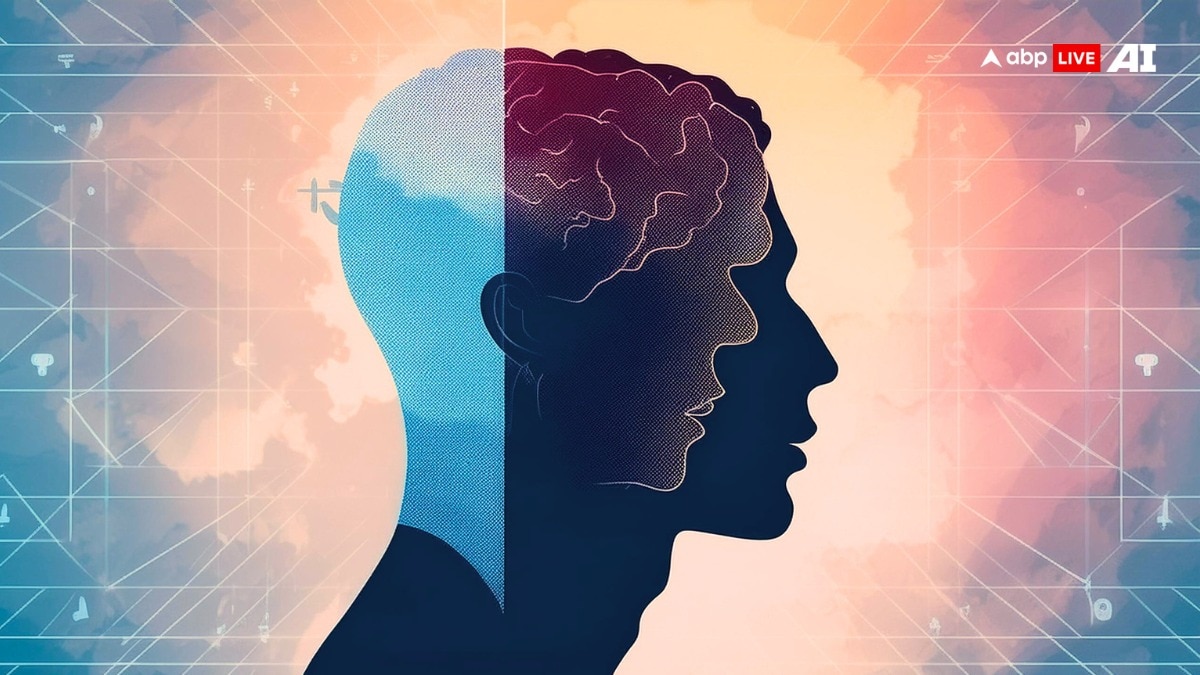Shama Sikander Opens Up About Her Battle With Bipolar Disorder. Know What It Is And How It Affects An Individual
Symptoms of bipolar disorder can be severe, resulting in damaged relationships, poor job and even suicide. In this regard, Shama Sikander opened up about her struggles as she battled bipolar disorder.

Bipolar disorder also known as manic-depressive disorder or manic depression, is a brain disorder that causes unusual shifts in moods, energy, activity levels, and the ability to carry out daily tasks. Symptoms of bipolar disorder can be severe, resulting in damaged relationships, poor job or school performance, and even suicide. Bipolar disorder is not easy to spot when it starts. Some people suffer for years before they are properly diagnosed and treated.
Bollywood Actress Shama Sikander, who battled bipolar disorder and depression for a long time, opened up about her struggles and challenges in a conversation with ABP Live. Best known for her role as 'Pooja' in 'Ye Meri Life Hai' Shama said that her best friend Vipul D Shah had always supported her through her struggles.
"Even if he sometimes didn’t understand it fully. He was always standing by me, along with a few of my other friends who are not from the industry," she said.
SHAMA SIKANDER ON HER BATTLES WITH BIPOLAR DISORDER:
Shama bravely spoke about all that she went through and the everyday struggles she was facing while battling her mental health issues.
"The most challenging thing was to get up in the morning and face the day and to fall asleep. I just couldn’t sleep for days. I felt such immense grief. I used to cry for hours and the confusion of it all. The darkness that just keeps sucking you. You feel like you’re shouting but no one can hear you. You just keep getting pulled into a dark well. It is the most scariest space you can ever be. I somehow pushed myself into walking every day for some time after not doing anything other than crying and being in bed for a year," she said.
She also revealed how she discovered her problem and decided to visit a psychiatrist at a friend's suggestion.
"I had been a very strong person earlier, full of life and love and suddenly I felt empty and burdened. Everything that I liked didn’t work for me anymore. I had no desires, no hope. I felt numb for months and years. I thought I could never heal from this and then a friend of mine who had a degree in psychology suggested that I might have bipolar disorder," she said.
"It was the first time I had heard of such a word for a symptom. He suggested that it would be helpful if I went and met a psychiatrist. I had no faith in his idea at that time because of my condition and what I was going through. He lovingly forced me into a meeting with a psychiatrist, who told me that I can heal," she added.
PROBABLE CAUSES OF BIPOLAR DISORDER:
About 2% of the population suffers from bipolar disorder. Most people are in their teens or early 20s when symptoms of bipolar disorder first appear. Nearly everyone with bipolar I disorder develops it before age 50. People with an immediate family member who has bipolar are at higher risk.
Dr. Neatu Narang, Professor and Senior Consultant, of Psychiatry, at Amrita Hospital Faridabad said, "The exact cause of bipolar disorder is unknown, but it is believed to be a combination of genetic, environmental, and neurobiological factors. Imbalances in certain neurotransmitters, such as dopamine and serotonin, play a role in the development of bipolar disorder. Stressful life events and traumatic experiences can also trigger episodes of mania or depression in individuals who are predisposed to bipolar disorder."
Explaining the factors in detail, Dr. Himanshu Nirvan, MBBS, MD (Psychiatry), Department of Psychiatry, Noida International Institute of Medical Sciences (NIIMS) & Hospital said the following:
- Genetics: There is evidence to suggest that genetics play a significant role in the development of bipolar disorder. Individuals with a family history of the condition are at a higher risk of developing it themselves.
- Brain Chemistry and Structure: Imbalances in neurotransmitters (chemical messengers in the brain) and abnormalities in brain structure and function may also contribute to bipolar disorder.
- Environmental Factors: Stressful life events, trauma, substance abuse, and significant life changes can trigger or exacerbate bipolar symptoms in susceptible individuals.
- Biological Factors: Hormonal imbalances, disruptions in the circadian rhythm, and other biological factors may also play a role in the development of bipolar disorder.
While there is no definitive way to predict or prevent bipolar disorder, Dr. Himanshu said that certain indicators may suggest a predisposition to the condition:
- Family History: Having a close relative with bipolar disorder increases the likelihood of developing the condition.
- Early Signs: Recognising early signs of mood disturbances, such as extreme mood swings, changes in energy levels, and disrupted sleep patterns, may indicate a vulnerability to bipolar disorder.
- Personal History: Individuals with a history of other mental health conditions, substance abuse, or traumatic experiences may be at a higher risk of developing bipolar disorder.
- Genetic Testing: While genetic testing for bipolar disorder is not common practice, advancements in genetic research may provide insights into the genetic factors contributing to the condition in the future.

IS BIPOLAR DISORDER GENDER-SPECIFIC?
Experiences of bipolar disorder vary significantly from person to person, and there are also notable general differences in how men and women experience the disorder.
Gautami Devi Chetri, Clinical Psychologist at Lissun said, "Research suggests that the disorder impacts males and females differently due to factors such as biological sex, including variations in symptoms, age of onset, genetic predisposition, substance use disorders, and environmental influences. Many studies have been done and have highlighted distinct differences in the clinical progression and various behavioural and social changes of bipolar disorder between the genders."
Talking about Bipolar II Disorder (BD II), Gautami said, "This presents differently across genders. It involves major depressive episodes and hypomania, a milder and shorter form of mania that is more commonly observed in women. Additionally, women with BD II are more likely to experience rapid cycling, characterized by having at least four mood episodes— either manic or depressive— in a year."
Explaining how Bipolar I Disorder (BD I) affects men and women, she said that it is equally prevalent among both genders. However, men are more likely to develop symptoms or experience their first episode at a younger age, whereas women may encounter a later onset," she added saying, "Bipolar disorder has hormonal elements that can impact how women experience symptoms during pregnancy, postpartum periods, menstruation, or menopause."

WHAT HAPPENS TO A PATIENT IN BIPOLAR DISORDER:
A person affected by bipolar disorder has had at least one manic episode in his or her life. Most people with bipolar disorder also suffer from episodes of depression. Often, there is a pattern of cycling between mania and depression. This is where the term 'manic depression' comes from. In between episodes of mania and depression, many people with bipolar disorder can live normal lives.
Dr. Neatu Narang explained in detail what happens to a patient in each of these phases.
Manic phase or Mania:
Explaining manic episodes, Dr. Narang said, "People in manic episodes may spend money far beyond their means, have sex with people they wouldn't otherwise, or pursue grandiose, unrealistic plans. In severe manic episodes, a person loses touch with reality. They may become delusional and behave bizarrely."
Here are some symptoms of mania:
- Talking very fast, jumping from one idea to another, having racing thoughts
- Being unusually distracted
- Increasing activities, such as multiple new projects
- Sleeping little or not being tired
- Having an unrealistic belief in self-abilities
- Behaving impulsively and engaging in pleasurable, high-risk behaviours
- Extreme irritability
- An overly happy or outgoing mood.
"Untreated, an episode of mania can last anywhere from a few days to several months. Most commonly, symptoms continue for a few weeks to a few months. Depression may follow shortly after, or not appear for weeks or months."
Depressive phase or Depression:
"Depressive episodes in bipolar disorder are similar to 'regular' clinical depression, with depressed mood, loss of pleasure, low energy and activity, feelings of guilt or worthlessness, and thoughts of suicide. Depressive symptoms of bipolar disorder can last weeks or months, but rarely longer than one year," explained Dr. Narang.
Here are some symptoms of depression:
- Feeling overly tired or slowed down
- Having problems concentrating, remembering, and making decisions
- Being restless or irritable
- Changing eating, sleeping, or other habits
- Thinking of death or suicide, or attempting suicide
- Loss of interest in activities once enjoyed, including sex
- Feeling sad or helpless
Patients also experience mixed episodes when symptoms of both mania and depression occur simultaneously, leading to severe emotional instability and an increased risk of suicidal behaviour.

COPING WITH BIPOLAR DISORDER:
Dr. Rahul Chandhok, who is the Head Psychiatrist, Head Consultant, and Mental Health and Behavioural Science, at Artemis Hospitals, said that to cope with this, there are some self-help strategies available. These include:
- Consistent Medication: Consistent use of prescribed medications, such as mood stabilizers, antipsychotics, and antidepressants, is important for managing symptoms.
- Psychotherapy: Engaging in cognitive-behavioral therapy (CBT) or other therapeutic approaches can help patients understand their condition, develop coping strategies, and address triggers.
- Consistent Routine: Establishing a regular daily routine, including consistent sleep patterns, helps stabilize mood.
- Healthy Lifestyle: Exercising regularly, taking a balanced diet, and avoiding alcohol and drugs contribute to overall well-being.
- Stress Management: Practicing relaxation techniques like mindfulness, yoga, or meditation, reduces stress and prevents mood swings.
- Support Networks: Joining support groups or connecting with others who have bipolar disorder provides a sense of belonging and understanding.
In addition, the family also has an important role to play in this. Family members should educate themselves about bipolar disorder to better understand the patient's experiences and challenges.
Dr. Rahul said, "Unconditional love, empathy, and encouragement offered by family members help the patient feel understood and less isolated. Family members can also help monitor symptoms and medication adherence, recognising early signs of mood swings and encouraging timely intervention."
"Furthermore, open and honest communication about feelings, symptoms, and concerns fosters a supportive environment. Moreover, knowing how to respond to emergencies, such as suicidal ideation or severe manic episodes, is vital. Having a crisis plan in place can prevent harm. Most importantly, creating a stable and stress-free home environment minimises potential triggers for mood swings," he added.

TREATMENT MODALITIES FOR PATIENTS WITH BIPOLAR DISORDER:
Bipolar disorder doesn't get better on its own, but it can be treated effectively over the long term.
Dr. Neatu Narang said, "Proper treatment helps patients with bipolar disorder gain better control of their mood swings and related symptoms. However, because it is a lifelong illness, long-term, continuous treatment is needed to control symptoms."
"Treatment is more effective if the patient works closely with a psychiatrist and talks openly about his / her concerns and choices. An effective maintenance plan usually includes a combination of medication and psychotherapy such as cognitive behavioural therapy, which helps to learn coping skills and manage their mood swings. Lifestyle changes such as maintaining a regular sleep schedule, regularly, and avoiding alcohol and drugs can also be beneficial," added Dr. Narang.
[Disclaimer: The information provided in the article, including treatment suggestions shared by doctors, is intended for general informational purposes only. It is not a substitute for professional medical advice, diagnosis, or treatment. Always seek the advice of your physician or other qualified healthcare provider with any questions you may have regarding a medical condition.]
Check out below Health Tools-
Calculate Your Body Mass Index ( BMI )
Calculate The Age Through Age Calculator





































